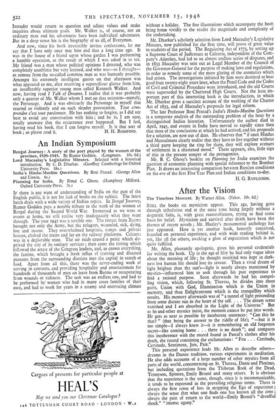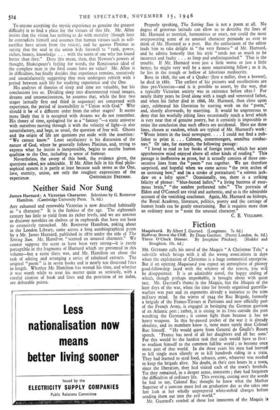After the Vision
The Timeless Moment. By Warner Allen. (Faber. 10s. 6d.) STILL the books on mysticism appear. This age, having gone through tribulation and at the same time being largely without a dogmatic faith, is, with great reasonableness, trying to find some basis for belief. Mysticism and survival after death have been the themes of recent novels ; Mr. Huxley's monumental anthology has just appeared. Here is yet another book, honestly conceived, founded on personal experience, and with wide reading behind it, yet, like all the others, awaking a glow of expectation which is not quite fulfilled.
Mr. Allen, pleasantly apologetic, gives his personal credentials for writing the book. Up to the age of fifty he had only vague ideas about the meaning of life ; he thought mankind was kept in dark- ness lest human life should lose its savour. Then a vivid dream of light brighter than the sun's—light is nearly always mentioned by mystics—influenced him to seek through his past experience to find a rational purpose. Soon afterwards he had his compel- ling vision, which, following St. Theresa, he divides into three parts, Union with God, Illumination which is the Union in memory, and then Enlightenment which is the tranquillity which results. His memory afterwards was of "a tunnel of light proceeding from some distant sun in the heart of the self. . . . The dream scene vanished and I am absorbed in the Light of the Universe." But as he and other mystics insist, the moment cannot be put into words. He gets as near as possible by incoherent sentences : "Can this be that? " (that being the answer to the riddle of life); " —but it is too simple—I always knew it—it is remembering an old forgotten secret—like coming home . . . there is no death "; and compares this incoherence with the record found in Pascal's clothes after his death, the record containing the exclamations : " Feu . . . Certitude, Certitude, Sentiment, Joie, Paix."
This personal experience leads Mr. Allen to describe others— dreams in the Dunne tradition, various experiments in meditation. He also adds accounts of a large number of other mystics from all parts of the world, concentrating on St. Theresa, Dante and Plotinus, but including quotations from the Thibetan Book of the Dead, Tennyson, Spinoza, Emily Bronte and many others. It is obvious that the experience is the same, though, since it is incommunicable, it tends to be expressed in the prevailing religious terms. There is always the first sense of loss in stripping the Ego of experience ; always the sense that what one finds one has known all the time ; always the pain of return to the world—Emily Bronte's " dreadful shock." "intense agony." To anyone accepting the mystic experience as genuine the greatest difficulty is to find a place for the virtues of this life. Mr. Allen insists that the vision has nothing to do with morality (though later he contradicts himself and assumes that human virtues such as self- sacrifice have arisen from the vision), and he quotes Plotinus as saying that the soul in the union bids farewell to " rank, power, riches, beauty, knowledge . . . with the scorn of one who has found better than they." Does this mean, then, that Newton's powers of thought, Shakespeare's feeling for words, the Renaissance ideal of the complete man in the final count have no value? Mr. Allen is in difficulties, but finally decides that experience remains, tentatively and unsatisfactorily suggesting that man undergoes rebirth with a period between each life for studying experience and the One.
His analyses of theories of sleep and time are valuable, but his conclusions less so. Dividing sleep into disconnected visual images, dreams and unconsciousness, he assumes that, while the first two stages (actually first and third in sequence) are concerned with experience, the period of insensibility is "Union with God." Why should it be of a different order from the other stages? It seems more likely that it is occupied with dreams we do not remember. His theory of time, apologised for as a " fantasy "—a static universe with ourselves moving through it with the velocity of light—is also unsatisfactory, and begs, as usual, the question of free will. Ghosts and the origin of life are quesions put aside with the assertion: "We cannot know." Least satisfactory is his discussion of the nature of God, where he generally follows Plotinus, and, trying to express what he insists is inexpressible, begins to ascribe human qualities to the One, including a sense of humour.
Nevertheless, the sweep of this book, the evidence given, the questions asked, are admirable. If Mr. Allen fails in his final philo- sophical system it is partly at least because such terms as the One, love, eternity, union, are only the roughest expressions of the



































 Previous page
Previous page